|
|
|
Sort Order |
|
|
|
Items / Page
|
|
|
|
|
|
|
| Srl | Item |
| 1 |
ID:
128484
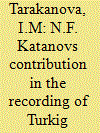

|
|
|
|
|
| Publication |
2013.
|
| Summary/Abstract |
Today the recording of languages is considered to be comparatively a new branch of linguistics, which is connected with field linguistics, i.e. with the study of languages in their natural habitation sphere. N. F.
Katanov may be rightfully named as a field scholar, who professionally approached the recording of languages. The main goal of recording is gathering and accumulation of primary data about poorly explored languages. It is especially now because their number is declining. As A. V. Arhipov notes, activity of a field linguist is aimed at description of 11 language, at direct study of the language phenomena, while various concrete research problems can be resolved. The goal of recording is to gather basic data, which would help to investigate a language hereafter (i.e. to resolve concrete research problems) even if it is impossible to get new data. Texts of different speech genres are fixed (stories, fairy-tales, legends, cases from life, etc.). N. F. Katanov may, therefore, be rightfully named as a true field linguist.
|
|
|
|
|
|
|
|
|
|
|
|
|
|
|
|
| 2 |
ID:
128482
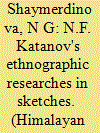

|
|
|
|
|
| Publication |
2013.
|
| Summary/Abstract |
Nickolay Fyodorovich Katanov is one of the outstanding scholar- Turcologists, a researcher of Ural-Altaic world. His creative work was devoted to multidimensional aspects of scientific activity: ethnography and history, linguistics and translation studies, literary studies and folklore, numismatics and museum work, archaeology and local lore. He was also a talented professor whose lectures drew numerous audience at Kazan University. In spite of the multidimensionality of N. F. Katanov's creative activity one of his main merits is the study and research of culture and ethnic world of the Turkic peoples in South Siberia, Eastern Turkestan and Central Asia. Katanov's collection during four years of his travels (1889-1892) of priceless material such as manuscripts and journal records testifies about it. Later these were published in Sketches of Uryzmkhai land.
|
|
|
|
|
|
|
|
|
|
|
|
|
|
|
|
| 3 |
ID:
128485
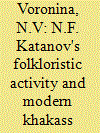

|
|
|
|
|
| Publication |
2013.
|
| Summary/Abstract |
N.F. Katanov's difficult, arduous folkloristic collection is of special value in literary studies and cognitive aspects in his extensive scienti?c, pedagogic, enlightening and social activity. Recorded and processed by an outstanding Khakass scholar, folklore texts are not only keepers and translators of the Turkic peoples' spiritual culture but they also accumulate creative work of Khakass poets and novelists. For example V. K. Tatarova (1952), a Khakass poet and novelist, distinguished public figure and famous theorist of Katanov studies wrote parables/ book of poems Cowberry on a palm in 1995 on the basis of materials of an ethnographic expedition around the Minusinsk depression carried out by N. F. Katanov in 1889-1892. It should be noted that "... in the sphere of the Turkic-speaking habitation of Siberia and Eastern Turkestan a researcher managed to collect a great linguistic, ethnographic and folklore material" which today is of
cognitive value as a collection of Turkic fairytales, fables, songs, proverbs and sayings. "Folklore materials were published in the IX volume of Folk literature samples of the Turkic tribes (St. Petersburgh, 1907) where folklore pieces of work of the Uryankhais (1,410 names), Khakasses (1,159 names), Karagases (203 names) were included"?
|
|
|
|
|
|
|
|
|
|
|
|
|
|
|
|
| 4 |
ID:
128487
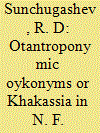

|
|
|
|
|
| Publication |
2013.
|
| Summary/Abstract |
In recent years in linguistics, investigation of proper names including anthroponymics and oykonymics has been developing extensively. Anthroponymics is a branch of onomastics, which studies anthroponyms
-personal names of people: proper names, patronymics (father's names or other names after father), surnames, tribal names, nicknames and pseudonyms (individual or group), cryptonyms (concealing names)';
oykonymics is a branch of toponymy, which studies oykonymsz, i.e. names of any settlements. These branches are still one of the poorly studied ?eld of Turkic onomastics. In Khakass toponymy considerable part of settlements' names belong to anthroponyms, i.e. proper names and surnames. Formed from anthroponyms, oykonyms give important information of linguistic, historical, ethnographical and ethnocultural nature. They point at the bygone settlement of peoples and tribes, reflect traditional folk culture
and change processes in the socio-political and economic life of people.
|
|
|
|
|
|
|
|
|
|
|
|
|
|
|
|
| 5 |
ID:
128483
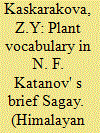

|
|
|
|
|
| Publication |
2013.
|
| Summary/Abstract |
Nickolay Fyodorovich Katanov was a great scholar, who gathered the richest material in ethnography, linguistics and folklore, providing a valuable source for studying different sides of the Turkic peoples' life, including Khakasses. Being a linguist- Turcologist N. F. Katanov started his scientific work with the study of the Khakass language, which he spoke, and relying on its knowledge, he began to research other related kind red languages. During his study in Krasnoyarsk high school, he went to various places every year, gathered folklore, linguistic texts and described the customs of the Sagay people. A researcher of the Tatar language D. G. Tumasheva notes: "Nicloloy Fyodorovich was not only an educated and intelligent man but he had his own material, which had been written by him from the first hand through direct contact with the people. N. F. Katanov laid emphasis on the latter, considering the necessity to study a language by means of direct interaction with the people and not by separating history of a language from ethnography, folklore and history of material culture."
|
|
|
|
|
|
|
|
|
|
|
|
|
|
|
|
| 6 |
ID:
128486


|
|
|
|
|
| Publication |
2013.
|
| Summary/Abstract |
The first information about the Khakass dialects and their phonetics is contained in pre-revolutionary sources, first of all in the works of M. A. Castren, V.V. Radloff, N. F. Katanov. In his work Versuch einer koibalischerz und karagassischerz Sprczchlehrel M. A. Castren described the Koybal dialect of the Khakass language; in the section Phonetics, he details the composition of vowels and consonants of the dialect. Next researcher in the phonetics of the Khakass dialects is V. V. Radloffz. It is for the first time in the history of Tu rcology, that he represented the entire classification of sound structure of the Turkic languages-'. I_ However, one of the most famous representatives of pre-October h Khakass studies is N. F. Katanov.
|
|
|
|
|
|
|
|
|
|
|
|
|
|
|
|
|
|
|
|
|